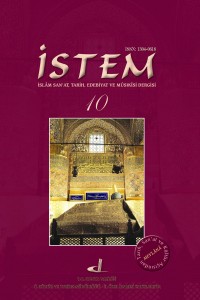Abstract
Anadolu tasavvuf hayatının en büyük siması Mevlânâ Celâleddîn-i Rûmî’ye nispet edilen Mevlevî Tarîkatı’na mahsus tasavvuf mûsıkîne “Mevlevî Mûsıkîsi” denmiştir. Bu mûsıkî, Türk dînî mûsıkîsinin Câmi ve Tekke mûsıkîsi şeklindeki iki türünden Tekke Mûsıkîsi’nin en mühim ve geniş dalını oluşturur. Klâsik Türk Mûsıkîmizin gelişmesinde ve Dînî Mûsıkîmizin oluşmasında Hz. Mevlânâ’nın ve Mevlevîliğin önemli bir yeri vardır. Mevlânâ, devrinin bütün sanatkârlarını olduğu gibi mûsıkî ehli olanları da ziyadesiyle taltif etmiş, mûsıkî konusunu eserlerinde sık sık dile getirmiş ve mûsıkîşinaslara daima ayrı bir değer vermiştir. Bu nedenle Mûsıkî, Mevlevîliğin önemli unsurlarından biri olmuş, bestesi ve sanat seviyesi yönünden Mevlevî Âyinleri, zikre yön veren ve idâre eden zâkirbaşlarına ihtiyaç duymaksızın, kendi akışı içerisinde kurallarını icrâya yansıtabilmiş bir dînî mûsiki formu haline gelmiştir. Ayrıca zaman içerisinde kendine has bir san’atsal çehre kazanmış, Mevlevî Âyini bestekârlığı ve icrâcılığı sanat çevresinde mûteber bir hâle gelmiştir. Mûsıkî tarihimize baktığımızda bestekarlarımızın tamamına yakınının mânevî bir terbiye görmüş, aldıkları dînî ve mânevî terbiyeyi eserleri vasıtasıyla insanlara ve toplumlara nakletmiş kimseler olduklarını görüyoruz. Bu edeb ve mânevî alt yapının verildiği eğitim kurumları da Mevlevîhâneler olmuştur. Mevlânâ dergahının bulunduğu Konya’mızda yetişen günümüz Mevlevî Âyini bestekârlarından Hafız Ahmet Çalışır ile bir bestekârın duygu, düşünce ve yorumlarını okuyucularımızla paylaşmak, bu çerçevede günümüzde yaşanan kimi problemlere ışık tutarak tarihe bir kayıt düşmek düşüncesiyle bu söyleşiyi gerçekleştirdik
Abstract
Mystical music which belongs to the Mawlawiyya Order ascribed to Mawlana Jalal al-Din Rumi, the prominent figure of the sufi life in Anatolia, is called “Mevlevi Musikisi”. This music constitutes the most important and the vast branch of the classical Sufi (Tekke) Music which is one of the two types of Turkish religious music: Mosque and Tekke Music. Mawlana and Mawlawiyya played an important role in the rise and development of the Classical Tuskish Music, as well as of the Religious Music. Mawlana has kindly treated all artists and the musicians at his time; mentioned the subject of music very often in his works and always appreciated the musicians very much. That’s why music has become one of the important elements of the Mawlawiyya and as far as the level of compose and art is concerned, the Mawlawi Rites have become the form of religious music which could perform its rules naturally without needing the heads of dhikr managing the dhikr. In addition to this, it has gained a special artistic aspect in the course of time and it became worthy to be the composer and performer of Mawlawi Rite in the environment of arts. When we look at our music history, we realize that almost all of our composers have taken spiritual training and passed religious and spiritual education to people and societies by means of their works. The Mawlawikhanas were the institutions of education in which this good manners and spiritual foundation were taught. We have made this interview with Hafız Ahmet Çalışır, a contemporary composer of Mawlawi Rite who was brought up in Konya where there is Mawlana Dergah in order to share the feelings, thoughts and comments of a composer with the readers
Details
| Other ID | JA52KS43UP |
|---|---|
| Journal Section | Interview |
| Authors | |
| Publication Date | December 1, 2007 |
| Submission Date | December 1, 2007 |
| Published in Issue | Year 2007 Issue: 10 |
This work is licensed under a Creative Commons Attribution-NonCommercial 4.0 International License (CC BY NC).


